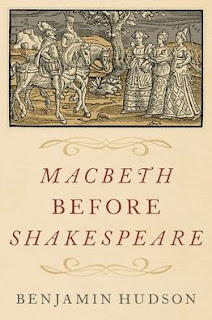 Viking Pirates and Christian Princes: Dynasty, Religion, and Empire in the North Atlantic and The Picts.
Viking Pirates and Christian Princes: Dynasty, Religion, and Empire in the North Atlantic and The Picts.
Hudson applied the "Page 99 Test" to his newest book, Macbeth before Shakespeare, and reported the following:
Page 99 of Macbeth before Shakespeare describes part of the long process that transformed Macbeth and his clan from heroes to villains. After his death, pretenders to the Scottish kingship claimed kinship with Macbeth and Lady Macbeth to provide legitimacy for their actions and permit them to wear the borrowed robes of royalty. One of the more intriguing was a monk turned warlord named Wimund. He was a member of the obscure Congregation of Savigny, a preaching order that expanded to the Isle of Man in the second quarter of the twelfth century. Wimund’s eloquence propelled him to the episcopal office and his diocese extended to the English coast. Landing there, Wimund claimed to be a descendant of Lady Macbeth and terrorized the region round Lancastershire until he was trapped in an ambush. Some contemporaries had doubts about his claims, but many accepted them.Learn more about Macbeth before Shakespeare at the Oxford University Press website.
This section is both representative and not representative of the book. Wimund probably was not a member of Macbeth’s family, but he wanted an association with that clan. This connects with a well-known theme in British and Irish literature: the myth of the vanquished hero with occult associations. Pretenders such as Wimund, emerging from the mists of the Irish Sea, contributed to the relationship of Macbeth with the uncanny.
Wimund’s career leads to the larger question of legitimacy. What constituted the right to rule? The early Scots, in common with other Gaelic-speaking peoples, believed it to be hereditary. There were elaborate rules of biological descent that determined who could or could not contest for high office. This, in turn, determined the lifestyle of individuals and their families. For the successful few there awaited a life of comparative comfort and freedom from most of the restrictions imposed on ordinary individuals. For the unfortunate many there beckoned a life of exhausting labor and scarce comforts.
Page 99 shows the political use of defeat. A biological connection, real or imaged, with a collapsing dynasty could rally the disaffected more effectively than astute generalship. As the historical Macbeth began the transition to a literary character, part of the process was the legend of a Lost Cause that was juxtaposed with the legend of the Deserved Defeat. We, like the twelfth-century audience, are asked to choose which is more plausible.
--Marshal Zeringue



